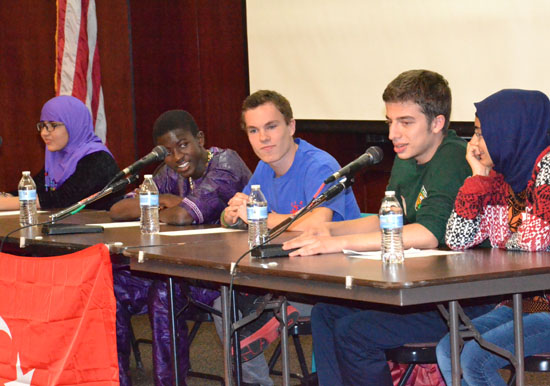VWHS sophs visit with foreign students
DAVE MOSIER/independent editor

A study of The Enlightenment, a cultural movement of the 17th and 18th centuries that pitted scientific study against religious beliefs, led to a visit Thursday with five students from countries where Islam is a major religious force.
VWHS sophomores in the project-based World Literature Team class learned more about Middle Eastern culture from exchange students from Mali, Turkey, Pakistan and Bosnia during the 1½-hour session held in the First Federal Savings Bank Lecture Hall.
The students, Falak Naz of Pakistan, Didar Coban and Muhammed Cetiner of Turkey, Aljosa Timarac of Bosnia and Sidiki Traore of Mali, provided presentations on their home countries and also answered questions from students during the visit to Van Wert.
The visit came about through the students’ current project, “The Enlightenment Meets the Middle East,” which helps students explore the influence of The Enlightenment on modern society.
The exchange students provided an insight into their way of life, but also showed that there is plenty of diversity in Middle Eastern cultures.
Naz, a very serious-minded Pakistani girl who wants to be a doctor, lives in a country where conservative Islamic traditions dictate much of its citizens’ lifestyle. It is a country where most girls are not allowed to complete school, but are, instead, married off at a young age, often as young as 16.
“However, my papa is different, he’s awesome!” Naz has said, using her favorite American slang term. “He allows me to apply for scholarships, which was a big shock to my family.”
In Turkey, a mostly secular country, religion isn’t as big of an influence. While Cetimer said Turkey celebrates traditional Muslim holidays, the country’s culture is much more secular than neighboring countries, such as Syria or Iran.
In Bosnia, which is not technically a Middle Eastern country, since it is located on the Balkan Peninsula in Europe, Islam is a part of the culture, since the country was part of the Ottoman Empire for more than 400 years, until it won its independence in the late 1800s.
Today, Timarac said, the country is split between the Slavic Croats, who are mostly-Orthodox Christians, and Muslims who stayed in the country after the break-up of the Ottoman Empire. Timarac, whose father is Slavic and his mother is a Muslim, is somewhat in the middle of the hostility that continues between the two cultures in Bosnia.
Although he was probably the most laid-back of the foreign students, adding that he often spends a couple of nights a week during the school year going to clubs with his friends, he said school in America was “easy” compared to Bosnia, where he would be taking up to 14 classes a day, rather than eight or so he’s taking here.
Timarac also said he was “disgusted” by the intensely segregated culture of his country, noting that schools in some parts of Bosnia are still divided between Muslims and Croats.
“Muslims enter by one entrance of the school and Croats by another,” he noted. “The look to each other through the fence, looking like the bars in jails. They don’t talk to each other or mix, because that is what they learn in school and, unfortunately, from their parents.”
Timarac said he hopes he will see the day when Bosnians live together in a peaceful, open-minded society.
Traore, from the West African country of Mali, a mostly-Islamic country that borders Algeria and several other West African nations, said he loved American culture, especially American music, but did not like rich people, mostly because of an experience he had in his own country as a young boy.
A VWHS teacher read a letter Traore had written about that experience, in which he related the story of how he had seen a poor man beg for food outside a rich man’s house, but that the rich man had had his guards turn the man away. An hour later, he saw the same man lying dead not far from the rich man’s house.
“As a child I didn’t care about anything, but this day I cried and started to hate rich people,” Traore wrote.
All of the foreign students used computers and social media to interact with friends, although there were wide-ranging differences between how much time was spent doing so.
Falak Naz, being from the most conservative country, said she spent less time on social media than the other four students.
For the VWHS students, the experience was eye-opening, with the local students learning how students in other countries live, but also discovering that life in those countries has many similarities to their own lives.
POSTED: 09/20/13 at 8:05 am. FILED UNDER: News







